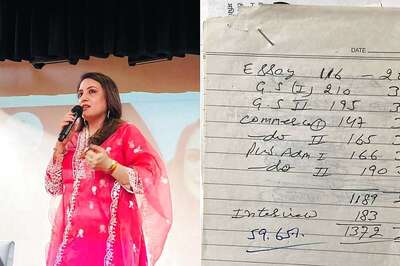
views
Beijing: A Beijing court will hear an espionage case on Thursday against Australian blogger Yang Hengjun, detained by Chinese authorities two years ago as he arrived from New York, against a backdrop of worsening ties between the two nations.
Details of the case have been shrouded in secrecy, with no information released on which espionage agency Yang, an Australian citizen born in China but living in New York immediately before he was held, is alleged to have acted for.
If convicted, he faces a jail term of 10 years or more on charges of endangering national security.
Australia has complained that Chinese authorities have not provided “any explanation or evidence for the charges”, prompting a rebuke on Saturday from the Chinese embassy in Canberra, the Australian capital.
Human rights lawyers Mo Shaoping and Shang Baojun will represent Yang when he appears at Thursday’s proceedings in the Beijing No. 2 Intermediate People’s Court, which will be closed to the public.
Yang’s wife, Yuan Xiaoliang, who has been unable to see him since the couple were stopped at the southern airport of Guangzhou in January 2019, applied to attend the court hearing but was rejected, friends told Reuters.
In his last message to family and friends in Australia before the hearing Yang said in March that his health had deteriorated but they should not worry because he had “no fear”.
“If someone wants to take revenge on me for my writings, please explain to the people inside China what I did, and the significance of my writing to people in China,” he said, according to a copy of the message seen by Reuters.
Diplomatic ties between the two nations have deteriorated sharply since Yang was detained, with China imposing trade sanctions on produce from Australia and reacting angrily to its call for an international inquiry into the origins of the coronavirus, as well as its 5G ban on telecoms giant Huawei.
Yang wrote about Chinese and American politics online as a high-profile blogger, and also penned a series of spy novels with plot lines centred on Taiwan, China and the United States.
He had been living in New York as a visiting scholar at Columbia University and earning income selling American goods online to Chinese consumers before flying to China to visit family for the Lunar New Year.
His January 2019 detention came at the same time as a Chinese police crackdown on potential foreign interference and “colour revolution”.
Yang had previously been arrested in 2011 in China on suspicion of being involved in the short-lived “Jasmine Revolution” protests and released after three days.
He wrote in a letter to his supporters in Australia after he was released that he had once worked for the Chinese state security agency in Hong Kong and Washington, before migrating to Australia in 1999.
In previous messages passed to consular officials during access visits, Yang has denied the espionage accusations against him and vowed not to confess to something he had not done.
In 2019, Australian Prime Minister Scott Morrison said it was “absolutely not true” that Yang had spied for Australia.
Foreign Minister Marise Payne called for access to the court hearing for Australian officials under a two-way consular pact, prompting an angry rebuke from the Chinese embassy, which said Australia should “respect China’s judicial sovereignty”.
Yang’s legal team has been forbidden to speak to the media about the content of the accusations facing him.
Disclaimer: This post has been auto-published from an agency feed without any modifications to the text and has not been reviewed by an editor
Read all the Latest News, Breaking News and Coronavirus News here. Follow us on Facebook, Twitter and Telegram.

















Comments
0 comment